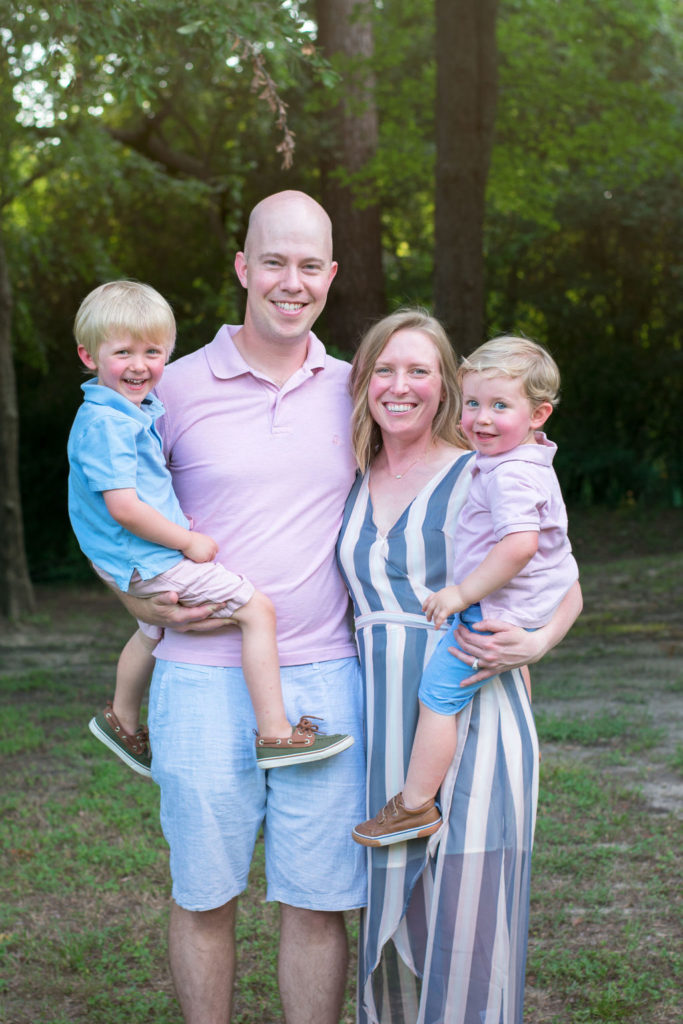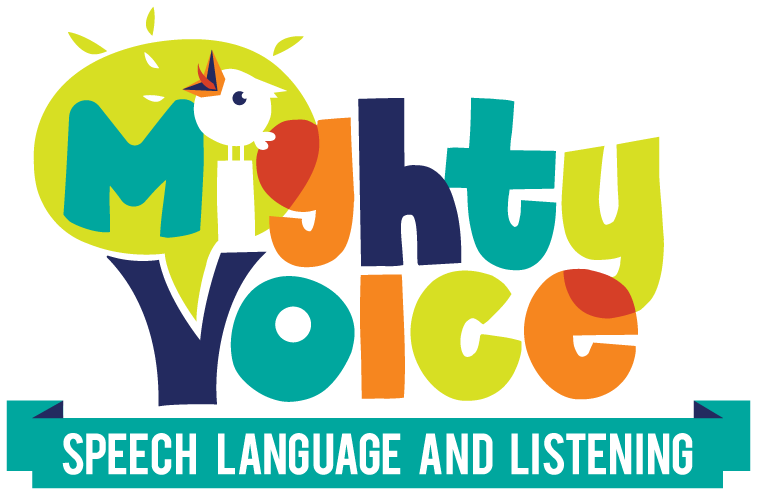Hello Mighty Voice readers! Today I’m so excited to bring you this interview with Elizabeth Gaffney. I first saw Elizabeth’s name on an e-book I love about auditory verbal strategies, and later found her on Instagram. I think readers will appreciate her insight having been in different roles in Deaf education, as well as her commitment to being part of the radical middle.

Can you tell us a little bit about yourself, and the kind of work that you do?
I am a wife and a mom to 2 (soon to be 3) children. We live in Houston, TX, my hometown. My husband and I met at college in Tennessee, lived in Philadelphia, PA for 3 years, and have been in Houston for 5 years. In my career I have taught preschool, second grade, Auditory Enrichment (intervention for auditory skills) all for children who are deaf and hard of hearing. I serve as an advocate as part of the ASTra program with Texas Hands & Voices helping families navigate educational settings/IEPs. I also have a side project called Bridges Auditory Verbal Practice where I share information on my blog and social media. It also allows me to see some clients privately at their homes.
As we await the arrival of baby #3 I have transitioned to part time work with a Listening and Spoken Language program in the Houston area as their Listening and Spoken Language Coordinator. In this role I will be mentoring their teachers, designing curriculum, collaborating with community partners, and organizing/providing professional development.
For those who don’t know, what is a Teacher of the Deaf, and an Auditory Verbal Educator, and how are they different (or the same)?
As a Teacher of the Deaf I completed my bachelor’s degree and passed the state certification tests. I could have gotten a job teaching at this point but chose to complete a Masters degree in Education of the Deaf before starting my first teaching position. My certification allowed me to teach preschool through 12th grade- any subject within a Deaf Education program. However, I have found that many high school programs also like you to have a minor or other training in a specific subject you are going to teach. This may or may not be the case in every program seeing as there is not an even distribution of programs and certified teachers across the nation.
I decided to pursue my Listening and Spoken Language Specialist Certification when I started teaching at Clarke School for Hearing and Speech in Philadelphia. There were other teachers and SLPs pursuing their certification and several certified professionals willing to serve as mentors. It was an easy decision because it was part of the natural environment to observe, be observed, and work in learning partnerships.
I think that going through the mentoring process and studying for the LSLS exam led me to be a better teacher. Having someone who routinely gave me feedback helped me to expand and strengthen my language facilitation strategies, increase my understanding of child development, and address my hesitancy in working with parents. Working with parents was one of my weakest areas because, at 23 years old, I didn’t know much about how to coach someone who might be my same age, much less about someone who was a more experienced adult and parent. It seemed intimidating. But as I was guided and coached to be a guide and coach to these families, this area became one of the areas of education I am most passionate about.
An Auditory Verbal Educator (or AVT) is the highest qualification a teacher of the deaf or SLP can attain. We can also pursue PhDs or Doctorates in Education- but few of these are specific to Deaf Education. Even fewer (to none) of these are specialized in Listening and Spoken Language.
On your website you write that you are “working to eliminate the extremes of bias in the field of deaf education with the hopes of more practitioners and parents finding a comfortable place radically in the middle.” What does that look like for you?
I strive to follow the example of The Radical Middle- an organization whose goal is to address the current bifurcation in the field of deaf education. They are working to create a community of practice among researchers, teachers, parents, and deaf individuals, around a common goal of philosophical partnership. They discuss and work to find understanding amongst divided parties on topics such as communication modes and educational options for the deaf and hard of hearing.
For me that looks like being a patient listener. I have had to learn to hear people out and ask good questions that help me understand someone’s point of view before sharing my own. It means learning to disagree in a mature way and agree to pick up the conversation at another time- maybe when we are calm, or when we have more information, or when we seek other guidance. It also means understanding that there are many “right” ways to go about the decisions families and professionals make. I am learning my influence as a professional on families and I hope to never take advantage of that privilege. I hope I can work as a partner, rather than an authority.
Most basically, being in the radical middle means that, although I am a LSLS, it does not mean that I have a belief that “all deaf children should….”. Perhaps that blank can be filled in with should be loved, should be taught, should have friends, should achieve their goals- these things have more value than what I would chose for a communication mode. So I choose to be in the middle and support the unique needs of each child and family.
You have a fabulous book that I often refer to on different auditory verbal strategies. What prompted you to write the book?
The book was initiated when I was in the middle of my LSLS mentoring. Some of the feedback I got on an observation was that I needed to diversify my language facilitation strategy “toolbox”. I asked if there was a resource where I could find more strategies to learn about and there was a list of various books, articles, and websites. I poured through these but really felt that I would be much more successful (and efficient) if there was at least a comprehensive list of strategies so I would know how far I had to grow. I mentioned this to my mentor and she responded something to the effect- “If you want something like that, you’d have to write it.” So I got started compiling research and we set out to make a resource where we could define and describe as many strategies as possible. It was important to me that these strategies had a foundation in research. I needed to know there was a “why” for doing these things and that the “why” was based in solid evidence.
It was not an easy journey with an out of state move and a baby along the way, but I learned an incredible amount in the process. If we have helped others learn and feel confident in their practice, we have reached our goal!
As a professional I love your ebook, but I can definitely see families benefit from it too. How have you seen families put it into practice in their own lives, and where can they access it?
One way I have used it with families (preschool age children) was to choose a target strategy for our next session during our reflection time. Then as preparation for the next session, I would email the handout for that strategy (just the targeted one so it wasn’t so overwhelming) to the parent and ask them to take a look and send any initial impressions. For the families I have done this with it has been successful in allowing them to become familiar with the terminology before we start coaching. Sometimes the example in the handout is sufficient in setting them up for success and sometimes we need to include more modeling. Then, we can go through the session and spend a little more time on putting the strategy into practice, noticing the effect it has on the language, instead of parsing out the definition.
By nature of being evidence-based the resource has some jargon in it, but when used in partnership with coaching, I think it can be a useful tool in showing parents your purpose behind certain targets or activities.
This resource can be downloaded for free on my website www.bridgesavp.com at www.auditory-verbal-mentoring.com (the website of our editor) or on a variety of other sites found by searching the title online
